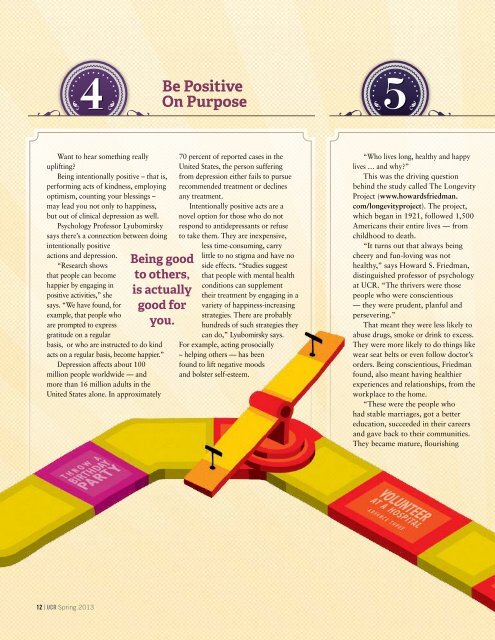Download PDF - UCR Magazine - University of California, Riverside
Download PDF - UCR Magazine - University of California, Riverside
Download PDF - UCR Magazine - University of California, Riverside
You also want an ePaper? Increase the reach of your titles
YUMPU automatically turns print PDFs into web optimized ePapers that Google loves.
12 | <strong>UCR</strong> Spring 2013<br />
4 5<br />
Want to hear something really<br />
uplifting?<br />
Being intentionally positive – that is,<br />
performing acts <strong>of</strong> kindness, employing<br />
optimism, counting your blessings –<br />
may lead you not only to happiness,<br />
but out <strong>of</strong> clinical depression as well.<br />
Psychology Pr<strong>of</strong>essor Lyubomirsky<br />
says there’s a connection between doing<br />
intentionally positive<br />
actions and depression.<br />
“Research shows<br />
that people can become<br />
happier by engaging in<br />
positive activities,” she<br />
says. “We have found, for<br />
example, that people who<br />
are prompted to express<br />
gratitude on a regular<br />
basis, or who are instructed to do kind<br />
acts on a regular basis, become happier.”<br />
Depression affects about 100<br />
million people worldwide — and<br />
more than 16 million adults in the<br />
United States alone. In approximately<br />
Be Positive<br />
On Purpose<br />
Being good<br />
to others,<br />
is actually<br />
good for<br />
you.<br />
70 percent <strong>of</strong> reported cases in the<br />
United States, the person suffering<br />
from depression either fails to pursue<br />
recommended treatment or declines<br />
any treatment.<br />
Intentionally positive acts are a<br />
novel option for those who do not<br />
respond to antidepressants or refuse<br />
to take them. They are inexpensive,<br />
less time-consuming, carry<br />
little to no stigma and have no<br />
side effects. “Studies suggest<br />
that people with mental health<br />
conditions can supplement<br />
their treatment by engaging in a<br />
variety <strong>of</strong> happiness-increasing<br />
strategies. There are probably<br />
hundreds <strong>of</strong> such strategies they<br />
can do,” Lyubomirsky says.<br />
For example, acting prosocially<br />
– helping others — has been<br />
found to lift negative moods<br />
and bolster self-esteem.<br />
“Who lives long, healthy and happy<br />
lives … and why?”<br />
This was the driving question<br />
behind the study called The Longevity<br />
Project (www.howardsfriedman.<br />
com/longevityproject). The project,<br />
which began in 1921, followed 1,500<br />
Americans their entire lives — from<br />
childhood to death.<br />
“It turns out that always being<br />
cheery and fun-loving was not<br />
healthy,” says Howard S. Friedman,<br />
distinguished pr<strong>of</strong>essor <strong>of</strong> psychology<br />
at <strong>UCR</strong>. “The thrivers were those<br />
people who were conscientious<br />
— they were prudent, planful and<br />
persevering.”<br />
That meant they were less likely to<br />
abuse drugs, smoke or drink to excess.<br />
They were more likely to do things like<br />
wear seat belts or even follow doctor’s<br />
orders. Being conscientious, Friedman<br />
found, also meant having healthier<br />
experiences and relationships, from the<br />
workplace to the home.<br />
“These were the people who<br />
had stable marriages, got a better<br />
education, succeeded in their careers<br />
and gave back to their communities.<br />
They became mature, flourishing


